Question: It was 3 a.m. when the wake-up call startled Steve McKenzie out of deep sleep. McKenzie, a management consultant from New Jersey, was glad to
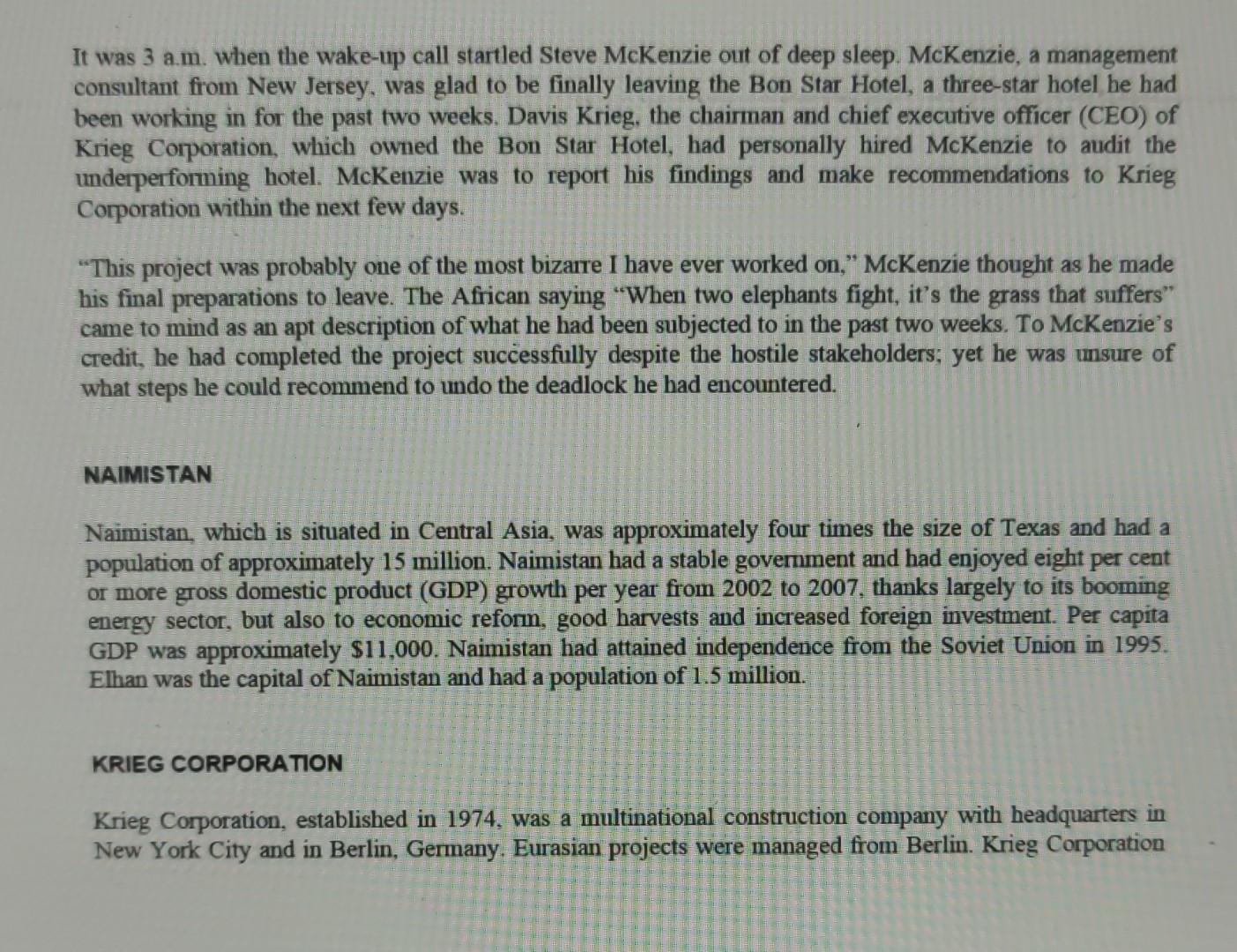
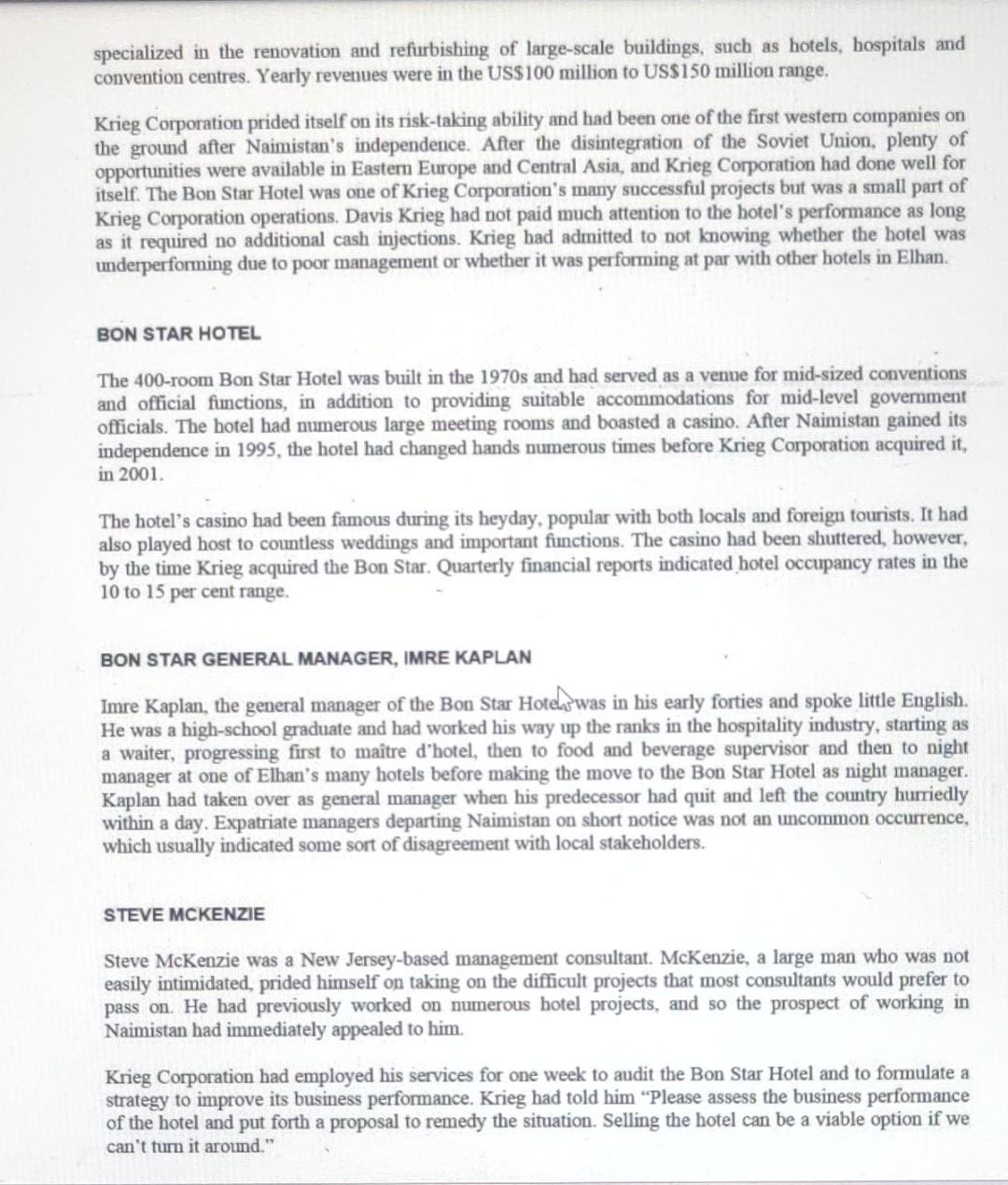
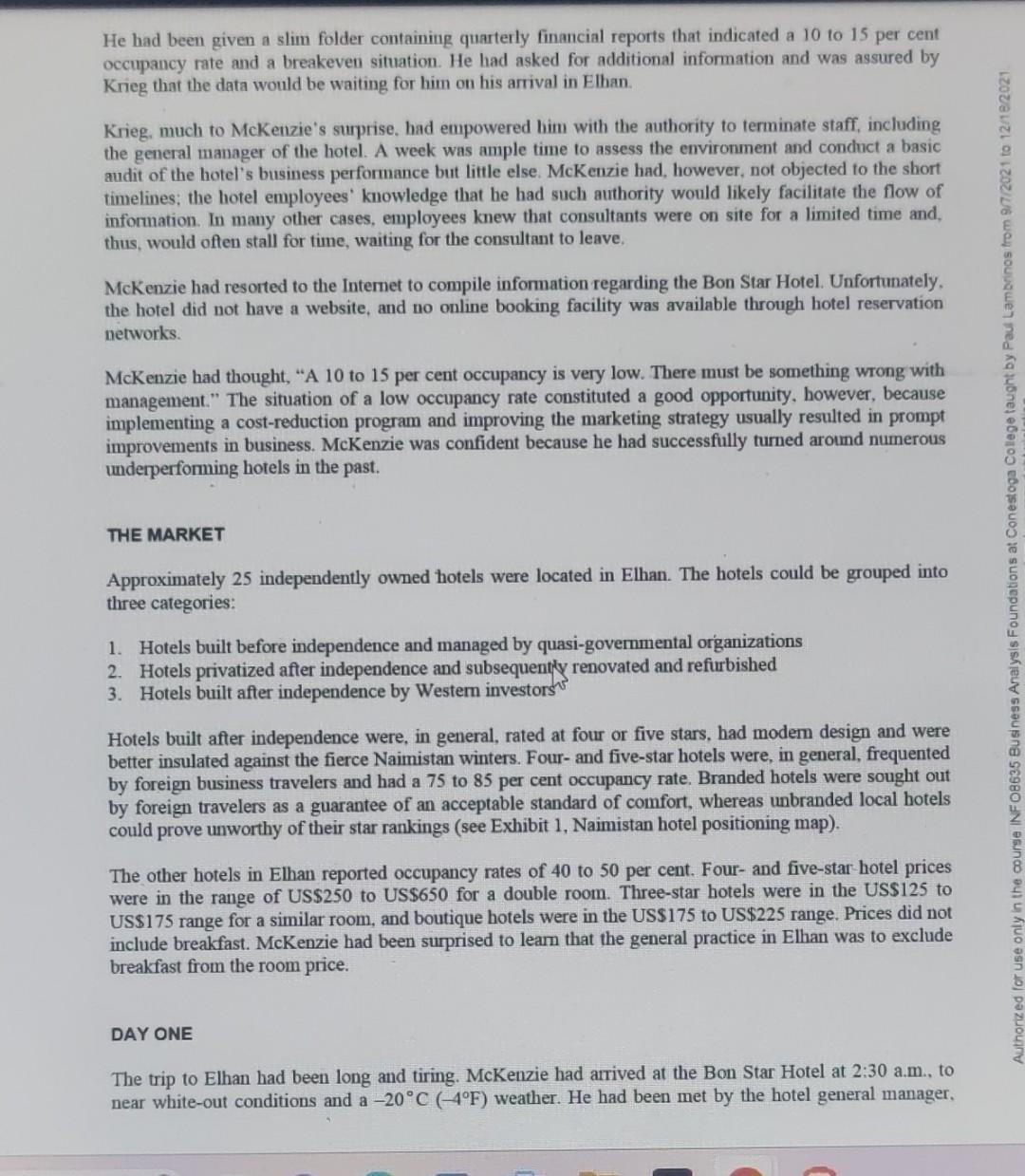
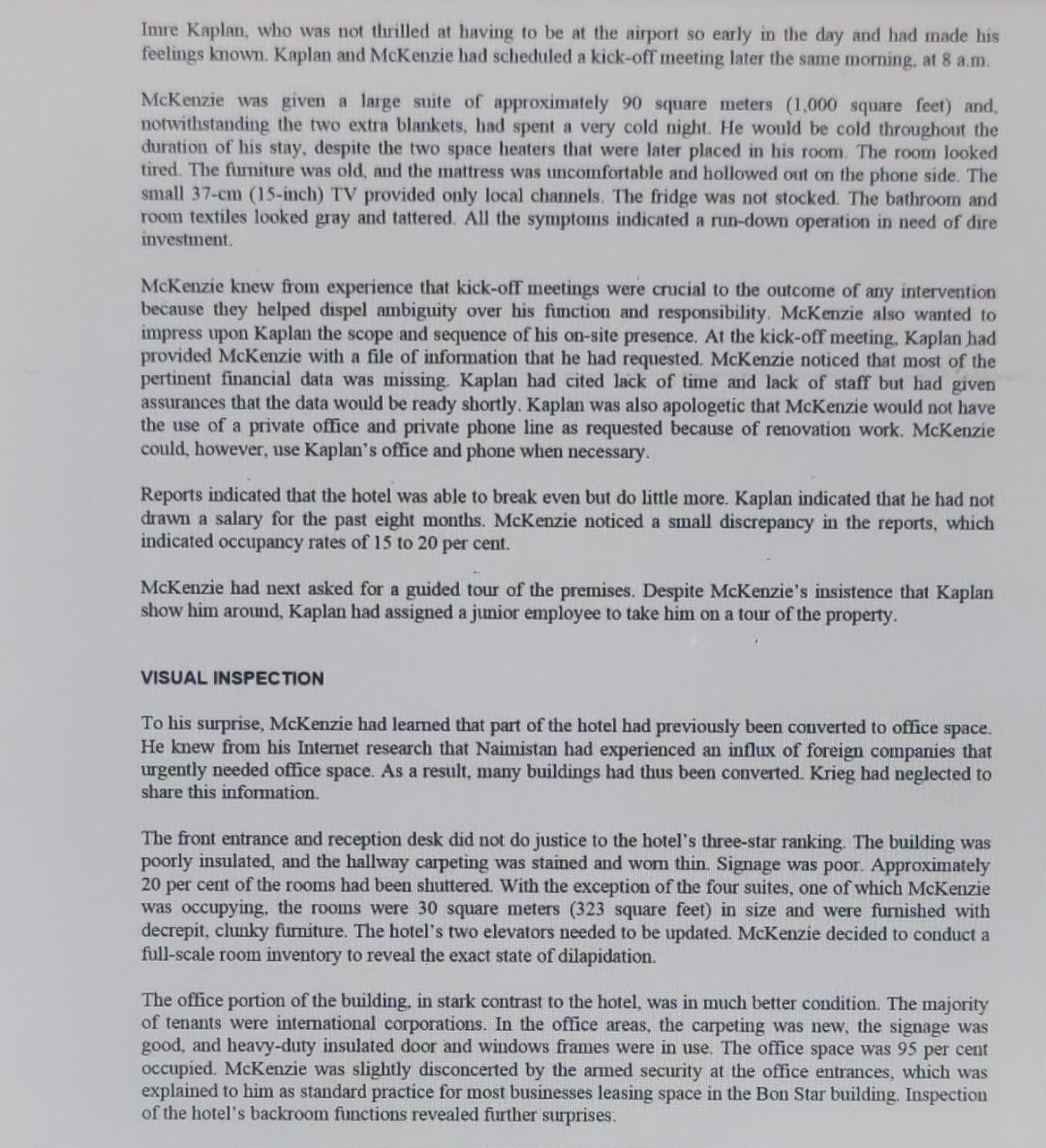
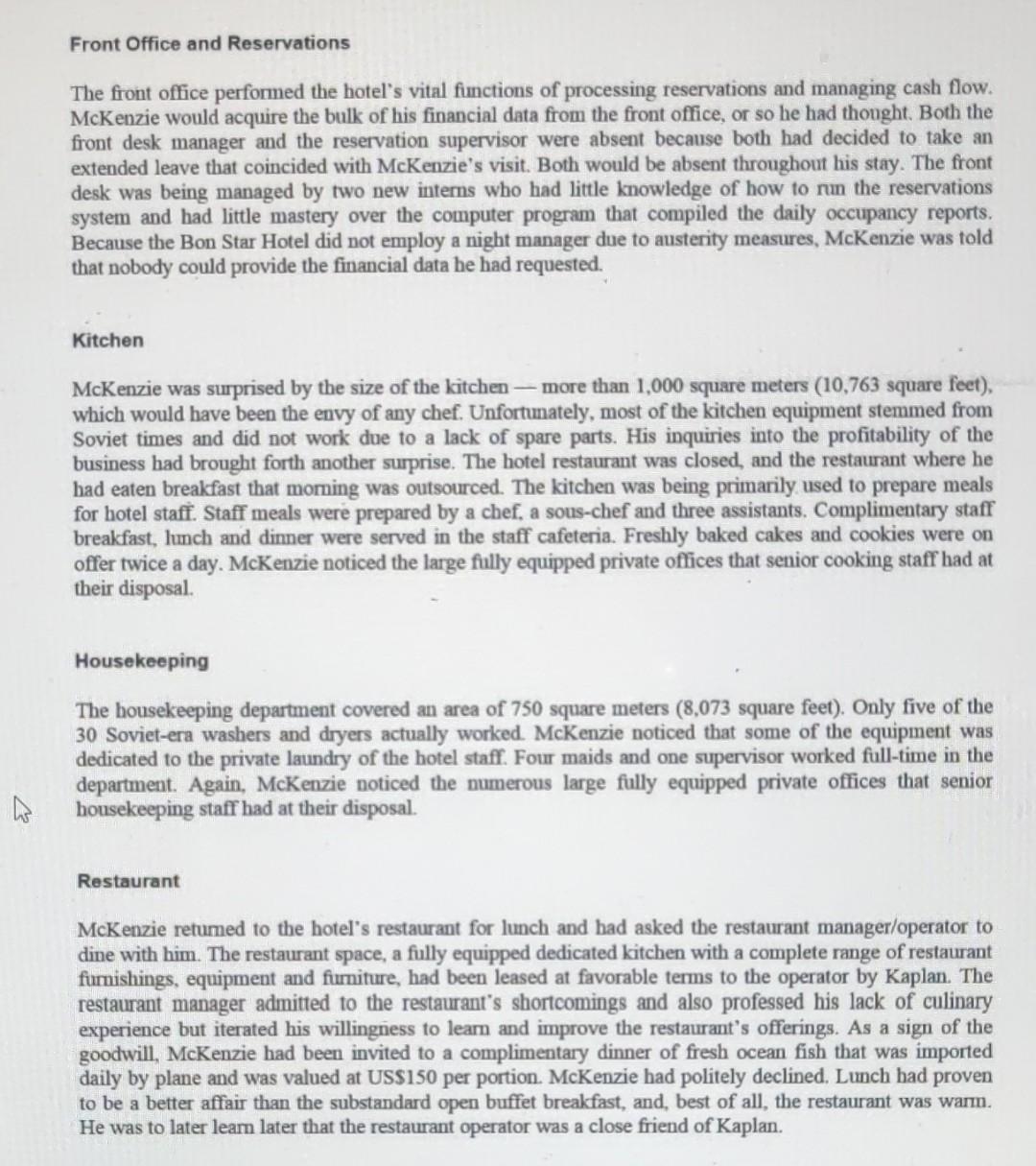
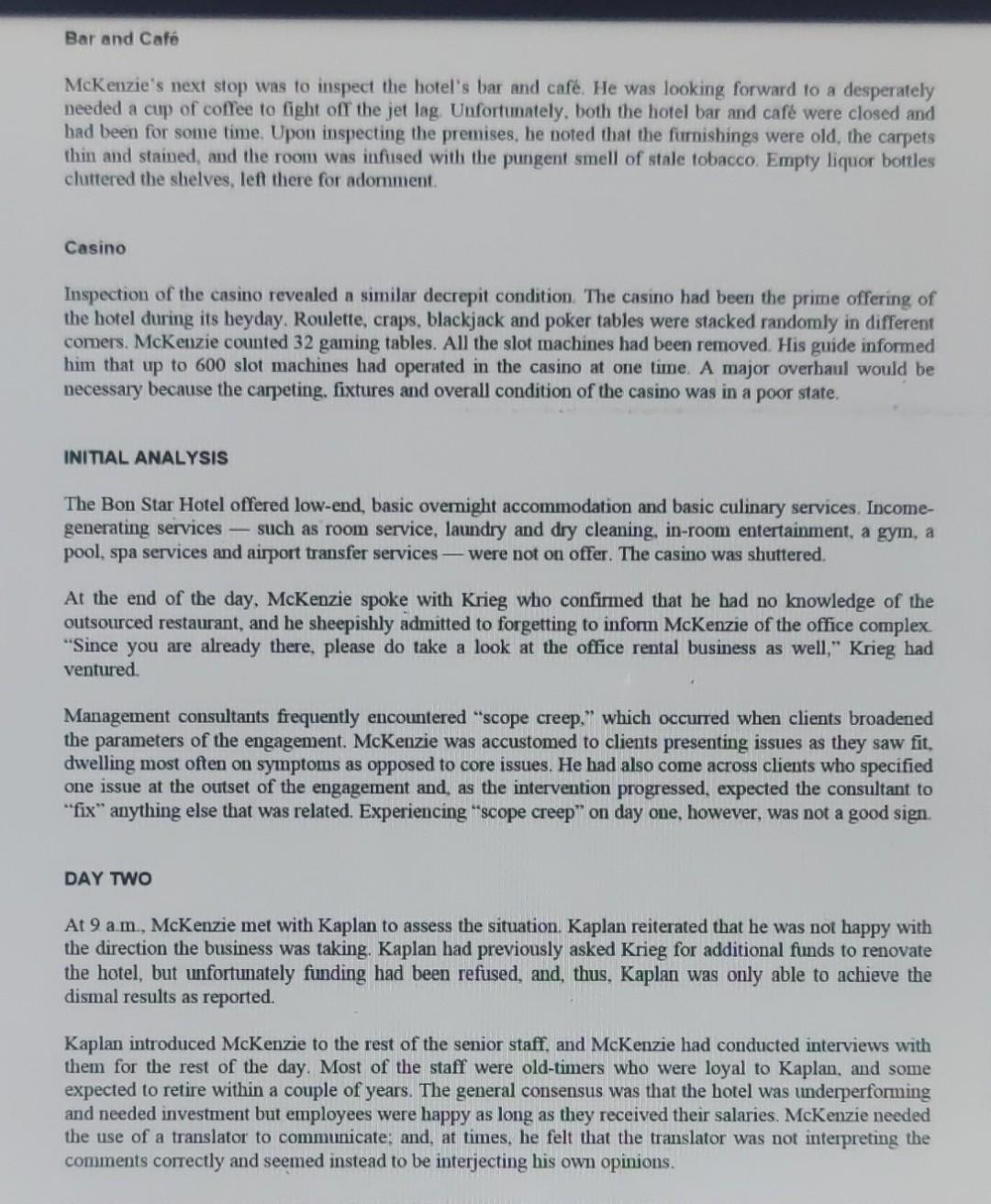
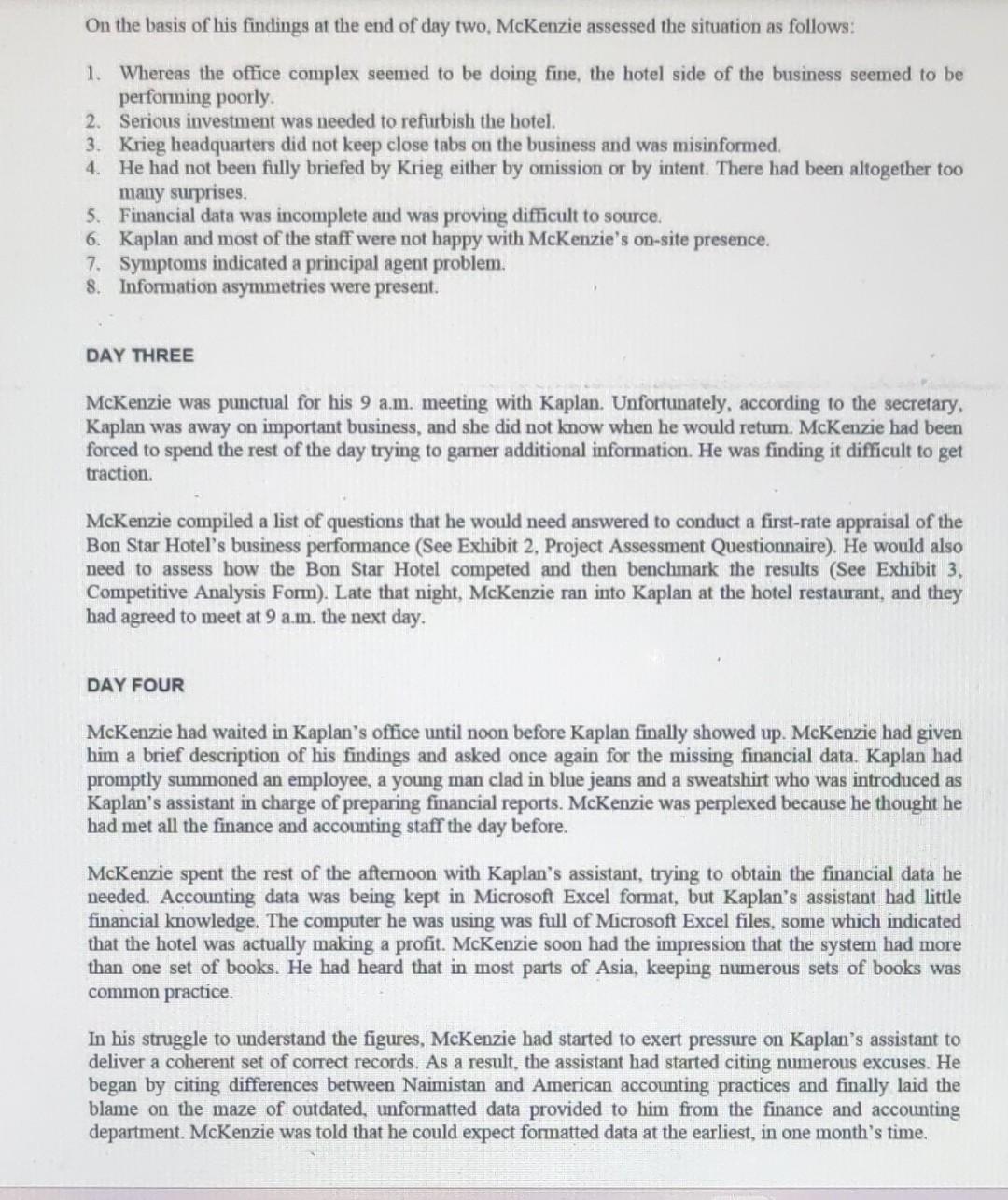
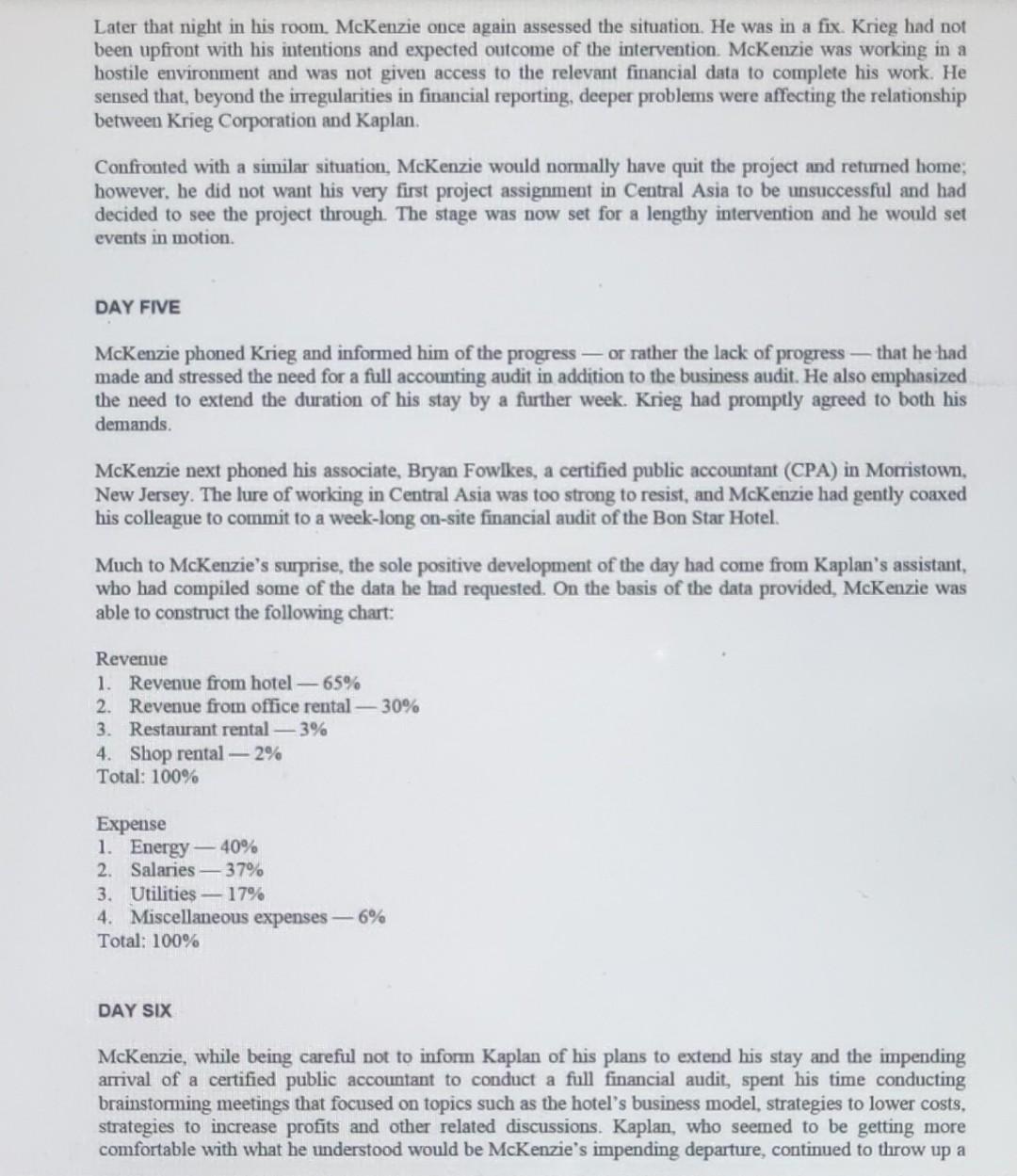
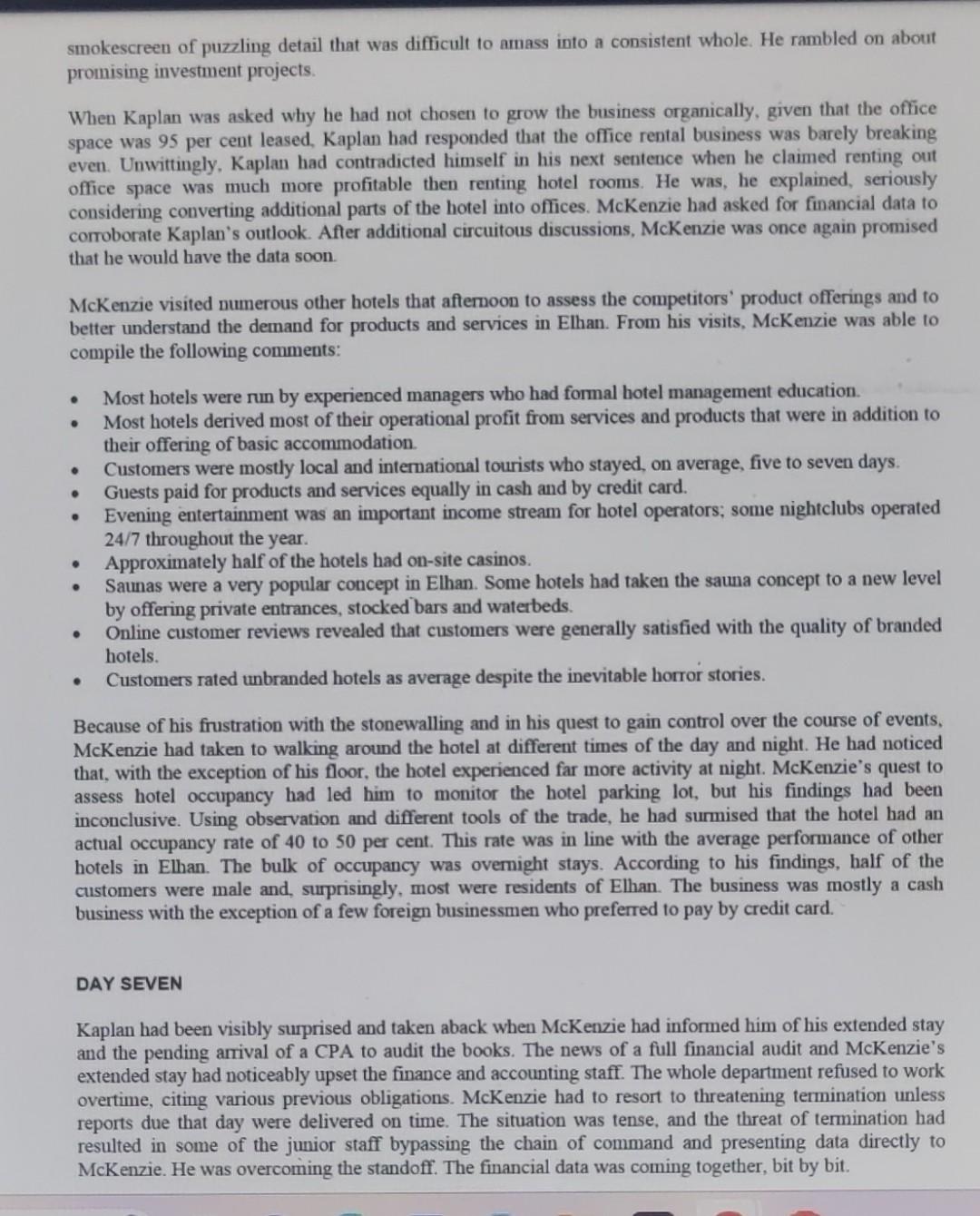
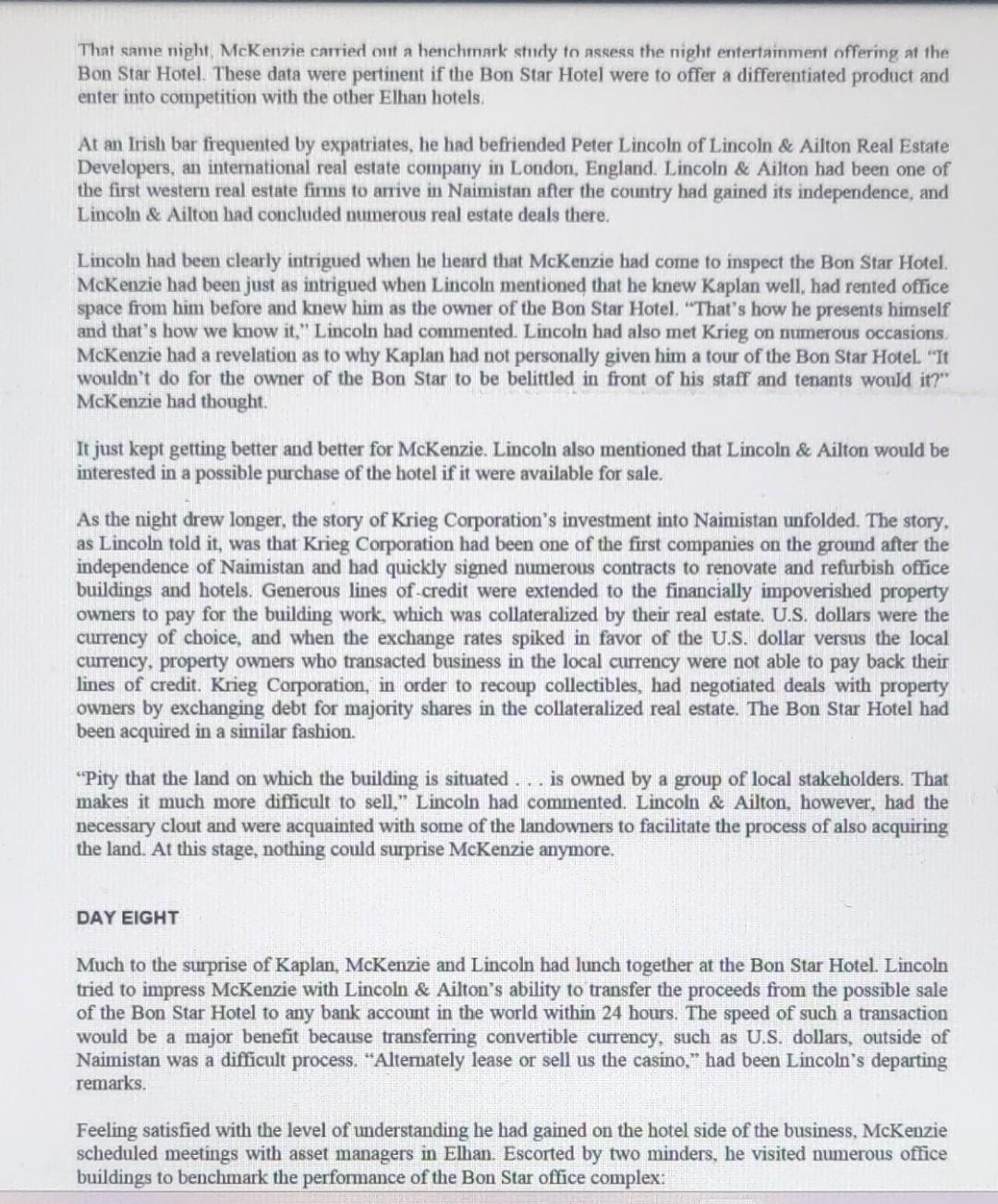
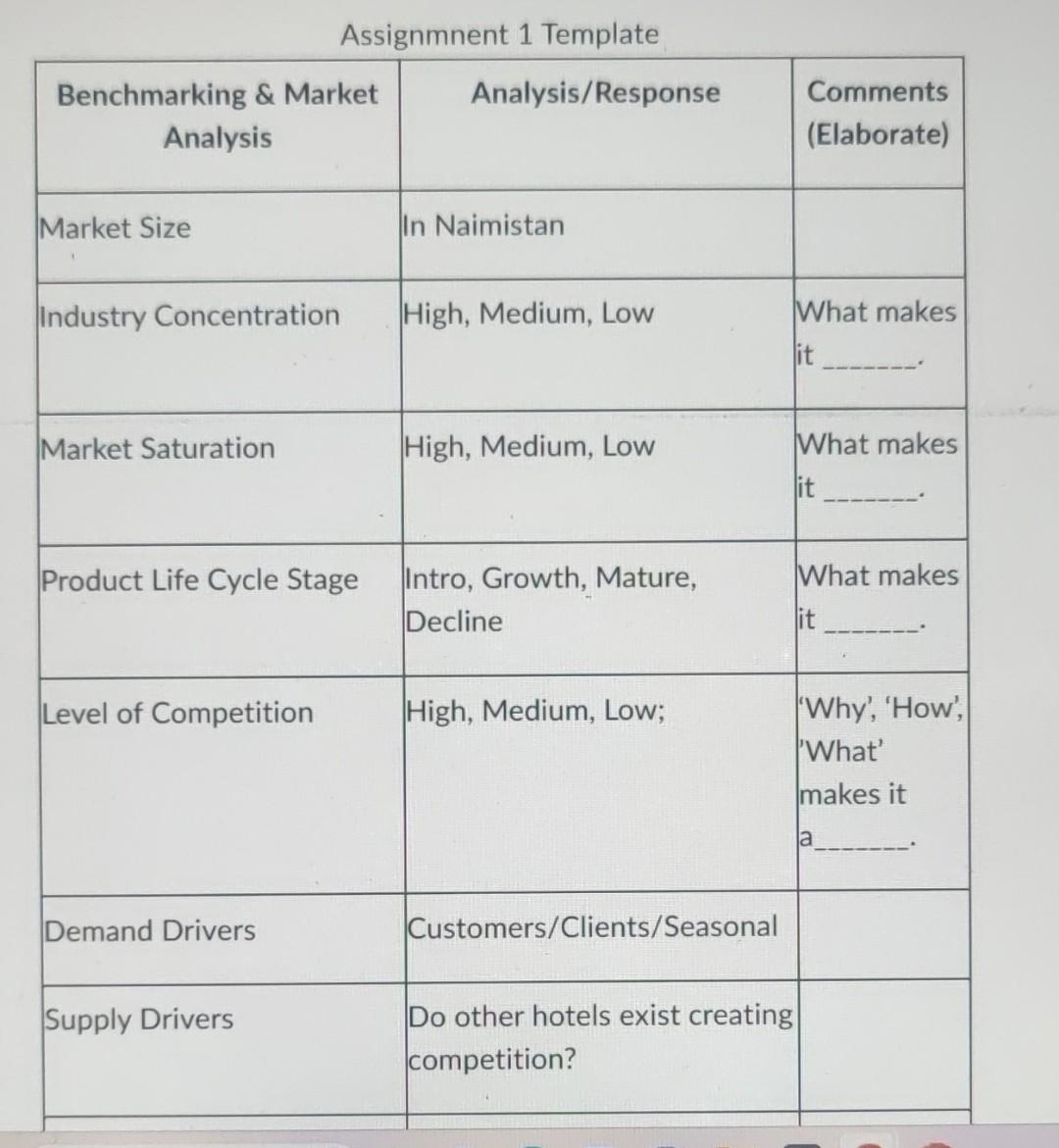
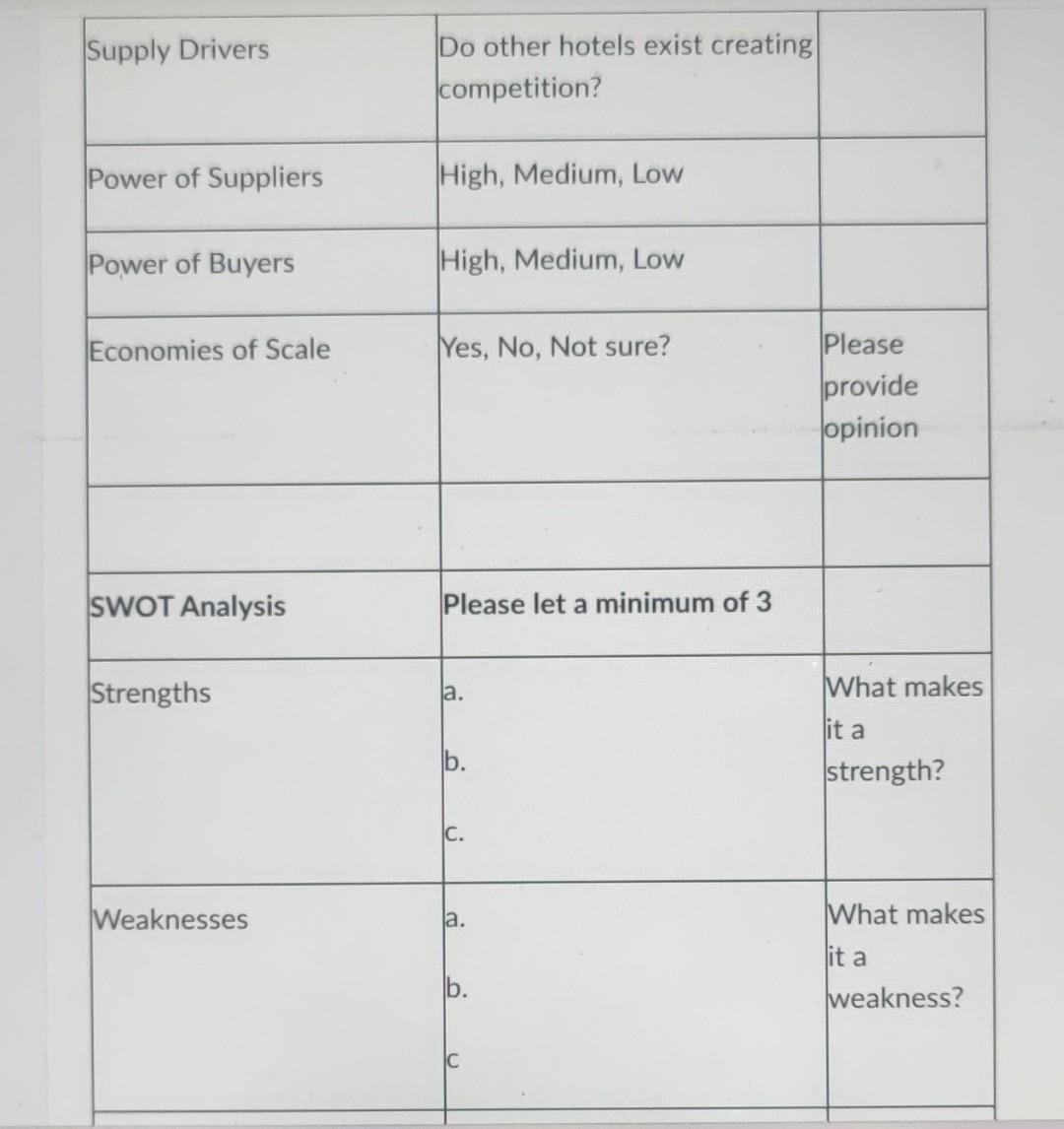
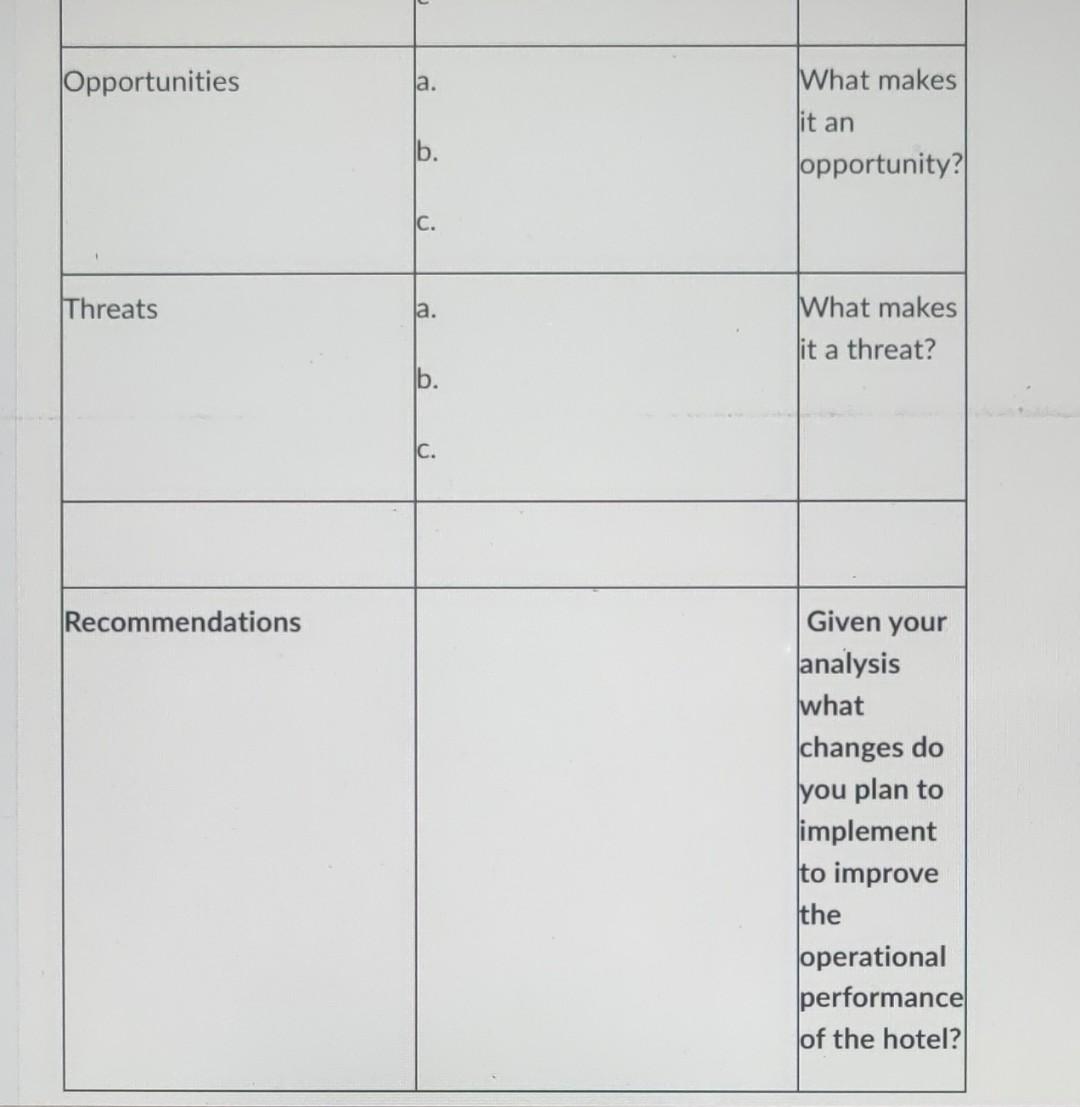
It was 3 a.m. when the wake-up call startled Steve McKenzie out of deep sleep. McKenzie, a management consultant from New Jersey, was glad to be finally leaving the Bon Star Hotel, a three-star hotel he had been working in for the past two weeks. Davis Krieg, the chairman and chief executive officer (CEO) of Krieg Corporation, which owned the Bon Star Hotel, had personally hired McKenzie to audit the underperforming hotel. McKenzie was to report his findings and make recommendations to Krieg Corporation within the next few days. "This project was probably one of the most bizarre I have ever worked on," McKenzie thought as he made his final preparations to leave. The African saying "When two elephants fight, it's the grass that suffers" came to mind as an apt description of what he had been subjected to in the past two weeks. To McKenzie's credit, he had completed the project successfully despite the hostile stakeholders; yet he was unsure of what steps he could recommend to undo the deadlock he had encountered. NAIMISTAN Naimistan, which is situated in Central Asia, was approximately four times the size of Texas and had a population of approximately 15 million. Naimistan had a stable government and had enjoyed eight per cent or more gross domestic product (GDP) growth per year from 2002 to 2007, thanks largely to its booming energy sector, but also to economic reform, good harvests and increased foreign investment. Per capita GDP was approximately $11,000. Naimistan had attained independence from the Soviet Union in 1995. Elhan was the capital of Naimistan and had a population of 1.5 million. KRIEG CORPORATION Krieg Corporation, established in 1974, was a multinational construction company with headquarters in New York City and in Berlin, Germany. Eurasian projects were managed from Berlin. Krieg Corporation specialized in the renovation and refurbishing of large-scale buildings, such as hotels, hospitals and convention centres. Yearly revenues were in the US\$100 million to US\$150 million range. Krieg Corporation prided itself on its risk-taking ability and had been one of the first western companies on the ground after Naimistan's independence. After the disintegration of the Soviet Union, plenty of opportunities were available in Eastern Europe and Central Asia, and Krieg Corporation had done well for itself. The Bon Star Hotel was one of Krieg Corporation's many successful projects but was a small part of Krieg Corporation operations. Davis Krieg had not paid much attention to the hotel's performance as long as it required no additional cash injections. Krieg had admitted to not knowing whether the hotel was underperforming due to poor management or whether it was performing at par with other hotels in Elhan. BON STAR HOTEL The 400-room Bon Star Hotel was built in the 1970s and had served as a venue for mid-sized conventions and official functions, in addition to providing suitable accommodations for mid-level government officials. The hotel had numerous large meeting rooms and boasted a casino. After Naimistan gained its independence in 1995, the hotel had changed hands numerous times before Krieg Corporation acquired it, in 2001. The hotel's casino had been famous during its heyday, popular with both locals and foreign tourists. It had also played host to countless weddings and important functions. The casino had been shuttered, however, by the time Krieg acquired the Bon Star. Quarterly financial reports indicated hotel occupancy rates in the 10 to 15 per cent range. BON STAR GENERAL MANAGER, IMRE KAPLAN Imre Kaplan, the general manager of the Bon Star Hotehrwas in his early forties and spoke little English. He was a high-school graduate and had worked his way up the ranks in the hospitality industry, starting as a waiter, progressing first to maitre d'hotel, then to food and beverage supervisor and then to night manager at one of Elhan's many hotels before making the move to the Bon Star Hotel as night manager. Kaplan had taken over as general manager when his predecessor had quit and left the country hurriedly within a day. Expatriate managers departing Naimistan on short notice was not an uncommon occurrence, which usually indicated some sort of disagreement with local stakeholders. STEVE MCKENZIE Steve McKenzie was a New Jersey-based management consultant. McKenzie, a large man who was not easily intimidated, prided himself on taking on the difficult projects that most consultants would prefer to pass on. He had previously worked on numerous hotel projects, and so the prospect of working in Naimistan had immediately appealed to him. Krieg Corporation had employed his services for one week to audit the Bon Star Hotel and to formulate a strategy to improve its business performance. Krieg had told him "Please assess the business performance of the hotel and put forth a proposal to remedy the situation. Selling the hotel can be a viable option if we can't turn it around." He had been given a slim folder containing quarterly financial reports that indicated a 10 to 15 per cent occupancy rate and a breakeven situation. He had asked for additional information and was assured by Krieg that the data would be waiting for him on his arrival in Elhan. Krieg, much to McKenzie's surprise, had empowered him with the authority to terminate staff, including the general manager of the hotel. A week was ample time to assess the environment and conduct a basic audit of the hotel's business performance but little else. McKenzie had, however, not objected to the short timelines; the hotel employees' knowledge that he had such authority would likely facilitate the flow of information. In many other cases, employees knew that consultants were on site for a limited time and, thus, would often stall for time, waiting for the consultant to leave. McKenzie had resorted to the Internet to compile information regarding the Bon Star Hotel. Unfortunately. the hotel did not have a website, and no online booking facility was available through hotel reservation networks. McKenzie had thought, "A 10 to 15 per cent occupancy is very low. There must be something wrong with management." The situation of a low occupancy rate constituted a good opportunity, however, because implementing a cost-reduction program and improving the marketing strategy usually resulted in prompt improvements in business. McKenzie was confident because he had successfully turned around numerous underperforming hotels in the past. THE MARKET Approximately 25 independently owned hotels were located in Elhan. The hotels could be grouped into three categories: 1. Hotels built before independence and managed by quasi-governmental organizations 2. Hotels privatized after independence and subsequently renovated and refurbished 3. Hotels built after independence by Western investors Hotels built after independence were, in general, rated at four or five stars, had modem design and were better insulated against the fierce Naimistan winters. Four- and five-star hotels were, in general, frequented by foreign business travelers and had a 75 to 85 per cent occupancy rate. Branded hotels were sought out by foreign travelers as a guarantee of an acceptable standard of comfort, whereas unbranded local hotels could prove unworthy of their star rankings (see Exhibit 1, Naimistan hotel positioning map). The other hotels in Elhan reported occupancy rates of 40 to 50 per cent. Four- and five-star-hotel prices were in the range of US\$250 to US\$650 for a double room. Three-star hotels were in the US\$125 to US\$175 range for a similar room, and boutique hotels were in the US\$175 to US\$225 range. Prices did not include breakfast. McKenzie had been surprised to learn that the general practice in Elhan was to exclude breakfast from the room price. DAY ONE The trip to Elhan had been long and tiring. McKenzie had arrived at the Bon Star Hotel at 2:30 a.m., to near white-out conditions and a 20C(4F) weather. He had been met by the hotel general manager, Imre Kaplan, who was not thrilled at having to be at the airport so early in the day and had made his feelings known. Kaplan and McKenzie had scheduled a kick-off meeting later the same morning. at 8 a.m. McKenzie was given a large suite of approximately 90 square meters (1,000 square feet) and, notwithstanding the two extra blankets, had spent a very cold night. He would be cold throughout the duration of his stay, despite the two space heaters that were later placed in his room. The room looked tired. The fumiture was old, and the mattress was uncomfortable and hollowed out on the phone side. The small 37cm (15-inch) TV provided only local channels. The fridge was not stocked. The bathroom and room textiles looked gray and tattered. All the symptoms indicated a run-down operation in need of dire investment. McKenzie knew from experience that kick-off meetings were crucial to the outcome of any intervention because they helped dispel ambiguity over his function and responsibility. McKenzie also wanted to impress upon Kaplan the scope and sequence of his on-site presence. At the kick-off meeting. Kaplan had provided McKenzie with a file of information that he had requested. McKenzie noticed that most of the pertinent financial data was missing. Kaplan had cited lack of time and lack of staff but had given assurances that the data would be ready shortly. Kaplan was also apologetic that McKenzie would not have the use of a private office and private phone line as requested because of renovation work. McKenzie could, however, use Kaplan's office and phone when necessary. Reports indicated that the hotel was able to break even but do little more. Kaplan indicated that he had not drawn a salary for the past eight months. McKenzie noticed a small discrepancy in the reports, which indicated occupancy rates of 15 to 20 per cent. McKenzie had next asked for a guided tour of the premises. Despite McKenzie's insistence that Kaplan show him around, Kaplan had assigned a junior employee to take him on a tour of the property. VISUAL INSPECTION To his surprise, McKenzie had learned that part of the hotel had previously been converted to office space. He knew from his Internet research that Naimistan had experienced an influx of foreign companies that urgently needed office space. As a result, many buildings had thus been converted. Krieg had neglected to share this information. The front entrance and reception desk did not do justice to the hotel's three-star ranking. The building was poorly insulated, and the hallway carpeting was stained and worn thin. Signage was poor. Approximately 20 per cent of the rooms had been shuttered. With the exception of the four suites, one of which McKenzie was occupying, the rooms were 30 square meters (323 square feet) in size and were furnished with decrepit, clunky furniture. The hotel's two elevators needed to be updated. McKenzie decided to conduct a full-scale room inventory to reveal the exact state of dilapidation. The office portion of the building, in stark contrast to the hotel, was in much better condition. The majority of tenants were international corporations. In the office areas, the carpeting was new, the signage was good, and heavy-duty insulated door and windows frames were in use. The office space was 95 per cent occupied. McKenzie was slightly disconcerted by the armed security at the office entrances, which was explained to him as standard practice for most businesses leasing space in the Bon Star building. Inspection of the hotel's backroom functions revealed further surprises: Front Office and Reservations The front office performed the hotel's vital functions of processing reservations and managing cash flow. McKenzie would acquire the bulk of his financial data from the front office, or so he had thonght. Both the front desk manager and the reservation supervisor were absent because both had decided to take an extended leave that coincided with McKenzie's visit. Both would be absent throughout his stay. The front desk was being managed by two new interns who had little knowledge of how to run the reservations system and had little mastery over the computer program that compiled the daily occupancy reports. Because the Bon Star Hotel did not employ a night manager due to austerity measures, McKenzie was told that nobody could provide the financial data he had requested. Kitchen McKenzie was surprised by the size of the kitchen - more than 1,000 square meters (10,763 square feet), which would have been the envy of any chef. Unfortunately, most of the kitchen equipment stemmed from Soviet times and did not work due to a lack of spare parts. His inquiries into the profitability of the business had brought forth another surprise. The hotel restaurant was closed, and the restaurant where he had eaten breakfast that morning was outsourced. The kitchen was being primarily used to prepare meals for hotel staff. Staff meals were prepared by a chef, a sous-chef and three assistants. Complimentary staff breakfast, lunch and dinner were served in the staff cafeteria. Freshly baked cakes and cookies were on offer twice a day. McKenzie noticed the large fully equipped private offices that senior cooking staff had at their disposal. Housekeeping The bousekeeping department covered an area of 750 square meters (8,073 square feet). Only five of the 30 Soviet-era washers and dryers actually worked. McKenzie noticed that some of the equipment was dedicated to the private laundry of the hotel staff. Four maids and one supervisor worked full-time in the department. Again, McKenzie noticed the numerous large fully equipped private offices that senior housekeeping staff had at their disposal. Restaurant McKenzie retumed to the hotel's restaurant for lunch and had asked the restaurant manager/operator to dine with him. The restaurant space, a fully equipped dedicated kitchen with a complete range of restaurant furnishings, equipment and furniture, had been leased at favorable terms to the operator by Kaplan. The restaurant manager admitted to the restaurant's shortcomings and also professed his lack of culinary experience but iterated his willingness to learn and improve the restaurant's offerings. As a sign of the goodwill, McKenzie had been invited to a complimentary dinner of fresh ocean fish that was imported daily by plane and was valued at US\$150 per portion. McKenzie had politely declined. Lunch had proven to be a better affair than the substandard open buffet breakfast, and, best of all, the restaurant was warm. He was to later learn later that the restaurant operator was a close friend of Kaplan. McKenzie's next stop was to inspect the hotel's bar and caf. He was looking forward to a desperately needed a cup of coffee to fight off the jet lag. Unfortunately, both the hotel bar and caf were closed and had been for some time. Upon inspecting the premises, he noted that the furnishings were old, the carpets thin and stained, and the room was infused with the pungent smell of stale tobacco. Empty liquor bottles cluttered the shelves, left there for adomment. Casino Inspection of the casino revealed a similar decrepit condition. The casino had been the prime offering of the hotel during its beyday. Roulette, craps, blackjack and poker tables were stacked randomly in different comers. McKenzie counted 32 gaming tables. All the slot machines had been removed. His guide informed him that up to 600 slot machines had operated in the casino at one time. A major overhaul would be necessary because the carpeting. fixtures and overall condition of the casino was in a poor state. INITIAL ANALYSIS The Bon Star Hotel offered low-end, basic overnight accommodation and basic culinary services. Incomegenerating services - such as room service, laundry and dry cleaning, in-room entertainment, a gym, a pool, spa services and airport transfer services - were not on offer. The casino was shuttered. At the end of the day, McKenzie spoke with Krieg who confirmed that he had no knowledge of the outsourced restaurant, and he sheepishly admitted to forgetting to inform McKenzie of the office complex. "Since you are already there, please do take a look at the office rental business as well," Krieg had ventured. Management consultants frequently encountered "scope creep," which occurred when clients broadened the parameters of the engagement. McKenzie was accustomed to clients presenting issues as they saw fit, dwelling most often on symptoms as opposed to core issues. He had also come across clients who specified one issue at the outset of the engagement and, as the intervention progressed, expected the consultant to "fix" anything else that was related. Experiencing "scope creep" on day one, however, was not a good sign. DAY TWO At 9 a m., McKenzie met with Kaplan to assess the situation. Kaplan reiterated that he was not happy with the direction the business was taking. Kaplan had previously asked Krieg for additional funds to renovate the hotel, but unfortunately funding had been refused, and, thus, Kaplan was only able to achieve the dismal results as reported. Kaplan introduced McKenzie to the rest of the senior staff, and McKenzie had conducted interviews with them for the rest of the day. Most of the staff were old-timers who were loyal to Kaplan, and some expected to retire within a couple of years. The general consensus was that the hotel was underperforming and needed investment but employees were happy as long as they received their salaries. McKenzie needed the use of a translator to communicate; and, at times, he felt that the translator was not interpreting the comments correctly and seemed instead to be interjecting his own opinions. On the basis of his findings at the end of day two, McKenzie assessed the situation as follows: 1. Whereas the office complex seemed to be doing fine, the hotel side of the business seemed to be performing poorly. 2. Serious investment was needed to refurbish the hotel. 3. Krieg headquarters did not keep close tabs on the business and was misinformed. 4. He had not been fully briefed by Krieg either by omission or by intent. There had been altogether too many surprises. 5. Financial data was incomplete and was proving difficult to source. 6. Kaplan and most of the staff were not happy with McKenzie's on-site presence. 7. Symptoms indicated a principal agent problem. 8. Information asymmetries were present. DAY THREE McKenzie was punctual for his 9 a.m. meeting with Kaplan. Unfortunately, according to the secretary, Kaplan was away on important business, and she did not know when he would return. McKenzie had been forced to spend the rest of the day trying to garner additional information. He was finding it difficult to get traction. McKenzie compiled a list of questions that he would need answered to conduct a first-rate appraisal of the Bon Star Hotel's business performance (See Exhibit 2, Project Assessment Questionnaire). He would also need to assess how the Bon Star Hotel competed and then benchmark the results (See Exhibit 3, Competitive Analysis Form). Late that night, McKenzie ran into Kaplan at the hotel restaurant, and they had agreed to meet at 9 a.m. the next day. DAY FOUR McKenzie had waited in Kaplan's office until noon before Kaplan finally showed up. McKenzie had given him a brief description of his findings and asked once again for the missing financial data. Kaplan had promptly summoned an employee, a young man clad in blue jeans and a sweatshirt who was introduced as Kaplan's assistant in charge of preparing financial reports. McKenzie was perplexed because he thought he had met all the finance and accounting staff the day before. McKenzie spent the rest of the afternoon with Kaplan's assistant, trying to obtain the financial data he needed. Accounting data was being kept in Microsoft Excel format, but Kaplan's assistant had little financial knowledge. The computer he was using was full of Microsoft Excel files, some which indicated that the hotel was actually making a profit. McKenzie soon had the impression that the system had more than one set of books. He had heard that in most parts of Asia, keeping numerous sets of books was common practice. In his struggle to understand the figures, McKenzie had started to exert pressure on Kaplan's assistant to deliver a coherent set of correct records. As a result, the assistant had started citing numerous excuses. He began by citing differences between Naimistan and American accounting practices and finally laid the blame on the maze of outdated, unformatted data provided to him from the finance and accounting department. McKenzie was told that he could expect formatted data at the earliest, in one month's time. Later that night in his room. McKenzie once again assessed the situation. He was in a fix. Krieg had not been upfront with his intentions and expected outcome of the intervention. McKenzie was working in a hostile environment and was not given access to the relevant financial data to complete his work. He sensed that, beyond the irregularities in financial reporting, deeper problems were affecting the relationship between Krieg Corporation and Kaplan. Confronted with a similar situation, McKenzie would normally have quit the project and retumed home; however, he did not want his very first project assignment in Central Asia to be unsuccessful and had decided to see the project through. The stage was now set for a lengthy intervention and he would set events in motion. DAY FIVE McKenzie phoned Krieg and informed him of the progress or rather the lack of progress that he had made and stressed the need for a full accounting audit in addition to the business audit. He also emphasized the need to extend the duration of his stay by a further week. Krieg had promptly agreed to both his demands. McKenzie next phoned his associate, Bryan Fowlkes, a certified public accountant (CPA) in Morristown, New Jersey. The lure of working in Central Asia was too strong to resist, and McKenzie had gently coaxed his colleague to commit to a week-long on-site financial audit of the Bon Star Hotel. Much to McKenzie's surprise, the sole positive development of the day had come from Kaplan's assistant, who had compiled some of the data he had requested. On the basis of the data provided, McKenzie was able to construct the following chart: Revenue 1. Revenue from hotel 65% 2. Revenue from office rental 30% 3. Restaurant rental 3% 4. Shop rental 2% Total: 100% Expense 1. Energy 40% 2. Salaries 37% 3. Utilities - 17% 4. Miscellaneous expenses 6% Total: 100% DAY SIX McKenzie, while being careful not to inform Kaplan of his plans to extend his stay and the impending arrival of a certified public accountant to conduct a full financial audit, spent his time conducting brainstorming meetings that focused on topics such as the hotel's business model, strategies to lower costs, strategies to increase profits and other related discussions. Kaplan, who seemed to be getting more comfortable with what he understood would be McKenzie's impending departure, continued to throw up a smokescreen of puzzling detail that was difficult to amass into a consistent whole. He rambled on about promising investment projects. When Kaplan was asked why he had not chosen to grow the business organically, given that the office space was 95 per cent leased, Kaplan had responded that the office rental business was barely breaking even. Unwittingly, Kaplan had contradicted himself in his next sentence when he claimed renting out office space was much more profitable then renting hotel rooms. He was, he explained, seriously considering converting additional parts of the hotel into offices. McKenzie had asked for financial data to corroborate Kaplan's outlook. After additional circuitous discussions, McKenzie was once again promised that he would have the data soon. McKenzie visited numerous other hotels that afternoon to assess the competitors' product offerings and to better understand the demand for products and services in Elhan. From his visits, McKenzie was able to compile the following comments: - Most hotels were run by experienced managers who had formal hotel management education. - Most hotels derived most of their operational profit from services and products that were in addition to their offering of basic accommodation. - Customers were mostly local and international tourists who stayed, on average, five to seven days. - Guests paid for products and services equally in cash and by credit card. - Evening entertainment was an important income stream for hotel operators; some nightclubs operated 24/7 throughout the year. - Approximately half of the hotels had on-site casinos. - Saunas were a very popular concept in Elhan. Some hotels had taken the sauna concept to a new level by offering private entrances, stocked bars and waterbeds. - Online customer reviews revealed that customers were generally satisfied with the quality of branded hotels. - Customers rated unbranded hotels as average despite the inevitable horror stories. Because of his frustration with the stonewalling and in his quest to gain control over the course of events, McKenzie had taken to walking around the hotel at different times of the day and night. He had noticed that, with the exception of his floor, the hotel experienced far more activity at night. McKenzie's quest to assess hotel occupancy had led him to monitor the hotel parking lot, but his findings had been inconclusive. Using observation and different tools of the trade, he had surmised that the hotel had an actual occupancy rate of 40 to 50 per cent. This rate was in line with the average performance of other hotels in Elhan. The bulk of occupancy was overnight stays. According to his findings, half of the customers were male and, surprisingly, most were residents of Elhan. The business was mostly a cash business with the exception of a few foreign businessmen who preferred to pay by credit card. DAY SEVEN Kaplan had been visibly surprised and taken aback when McKenzie had informed him of his extended stay and the pending arrival of a CPA to audit the books. The news of a full financial audit and McKenzie's extended stay had noticeably upset the finance and accounting staff. The whole department refused to work overtime, citing various previous obligations. McKenzie had to resort to threatening termination unless reports due that day were delivered on time. The situation was tense, and the threat of termination had resulted in some of the junior staff bypassing the chain of command and presenting data directly to McKenzie. He was overcoming the standoff. The financial data was coming together, bit by bit. That same night, McKenzie carried out a henchmark study to assess the night entertainment offering at the Bon Star Hotel. These data were pertinent if the Bon Star Hotel were to offer a differentiated product and enter into competition with the other Elhan hotels. At an Irish bar frequented by expatriates, he had befriended Peter Lincoln of Lincoln \& Ailton Real Estate Developers, an international real estate company in London, England. Lincoln \& Ailton had been one of the first western real estate firms to arrive in Naimistan after the country had gained its independence, and Lincoln \& Ailton had concluded numerous real estate deals there. Lincoln had been clearly intrigued when he heard that McKenzie had come to inspect the Bon Star Hotel. McKenzie had been just as intrigued when Lincoln mentioned that he knew Kaplan well, had rented office space from him before and knew him as the owner of the Bon Star Hotel. "That's how he presents himself and that's how we know it," Lincoln had commented. Lincoln had also met Krieg on numerous occasions. McKenzie had a revelation as to why Kaplan had not personally given him a tour of the Bon Star HoteL "It wouldn't do for the owner of the Bon Star to be belittled in front of his staff and tenants would it?" McKenzie had thought. It just kept getting better and better for McKenzie. Lincoln also mentioned that Lincoln \& Ailton would be interested in a possible purchase of the hotel if it were available for sale. As the night drew longer, the story of Krieg Corporation's investment into Naimistan unfolded. The story, as Lincoln told it, was that Krieg Corporation had been one of the first companies on the ground after the independence of Naimistan and had quickly signed numerous contracts to renovate and refurbish office buildings and hotels. Generous lines of credit were extended to the financially impoverished property owners to pay for the building work, which was collateralized by their real estate. U.S. dollars were the currency of choice, and when the exchange rates spiked in favor of the U.S. dollar versus the local currency, property owners who transacted business in the local currency were not able to pay back their lines of credit. Krieg Corporation, in order to recoup collectibles, had negotiated deals with property owners by exchanging debt for majority shares in the collateralized real estate. The Bon Star Hotel had been acquired in a similar fashion. "Pity that the land on which the building is situated . . . is owned by a group of local stakeholders. That makes it much more difficult to sell," Lincoln had commented. Lincoln \& Ailton, however, had the necessary clout and were acquainted with some of the landowners to facilitate the process of also acquiring the land. At this stage, nothing could surprise McKenzie anymore. DAY EIGHT Much to the surprise of Kaplan, McKenzie and Lincoln had lunch together at the Bon Star Hotel. Lincoln tried to impress McKenzie with Lincoln \& Ailton's ability to transfer the proceeds from the possible sale of the Bon Star Hotel to any bank account in the world within 24 hours. The speed of such a transaction would be a major benefit because transferring convertible currency, such as U.S. dollars, outside of Naimistan was a difficult process. "Altemately lease or sell us the casino," had been Lincoln's departing remarks. Feeling satisfied with the level of understanding he had gained on the hotel side of the business, McKenzie scheduled meetings with asset managers in Elhan. Escorted by two minders, he visited numerous office buildings to benchmark the performance of the Bon Star office complex: Assignmnent 1 Template It was 3 a.m. when the wake-up call startled Steve McKenzie out of deep sleep. McKenzie, a management consultant from New Jersey, was glad to be finally leaving the Bon Star Hotel, a three-star hotel he had been working in for the past two weeks. Davis Krieg, the chairman and chief executive officer (CEO) of Krieg Corporation, which owned the Bon Star Hotel, had personally hired McKenzie to audit the underperforming hotel. McKenzie was to report his findings and make recommendations to Krieg Corporation within the next few days. "This project was probably one of the most bizarre I have ever worked on," McKenzie thought as he made his final preparations to leave. The African saying "When two elephants fight, it's the grass that suffers" came to mind as an apt description of what he had been subjected to in the past two weeks. To McKenzie's credit, he had completed the project successfully despite the hostile stakeholders; yet he was unsure of what steps he could recommend to undo the deadlock he had encountered. NAIMISTAN Naimistan, which is situated in Central Asia, was approximately four times the size of Texas and had a population of approximately 15 million. Naimistan had a stable government and had enjoyed eight per cent or more gross domestic product (GDP) growth per year from 2002 to 2007, thanks largely to its booming energy sector, but also to economic reform, good harvests and increased foreign investment. Per capita GDP was approximately $11,000. Naimistan had attained independence from the Soviet Union in 1995. Elhan was the capital of Naimistan and had a population of 1.5 million. KRIEG CORPORATION Krieg Corporation, established in 1974, was a multinational construction company with headquarters in New York City and in Berlin, Germany. Eurasian projects were managed from Berlin. Krieg Corporation specialized in the renovation and refurbishing of large-scale buildings, such as hotels, hospitals and convention centres. Yearly revenues were in the US\$100 million to US\$150 million range. Krieg Corporation prided itself on its risk-taking ability and had been one of the first western companies on the ground after Naimistan's independence. After the disintegration of the Soviet Union, plenty of opportunities were available in Eastern Europe and Central Asia, and Krieg Corporation had done well for itself. The Bon Star Hotel was one of Krieg Corporation's many successful projects but was a small part of Krieg Corporation operations. Davis Krieg had not paid much attention to the hotel's performance as long as it required no additional cash injections. Krieg had admitted to not knowing whether the hotel was underperforming due to poor management or whether it was performing at par with other hotels in Elhan. BON STAR HOTEL The 400-room Bon Star Hotel was built in the 1970s and had served as a venue for mid-sized conventions and official functions, in addition to providing suitable accommodations for mid-level government officials. The hotel had numerous large meeting rooms and boasted a casino. After Naimistan gained its independence in 1995, the hotel had changed hands numerous times before Krieg Corporation acquired it, in 2001. The hotel's casino had been famous during its heyday, popular with both locals and foreign tourists. It had also played host to countless weddings and important functions. The casino had been shuttered, however, by the time Krieg acquired the Bon Star. Quarterly financial reports indicated hotel occupancy rates in the 10 to 15 per cent range. BON STAR GENERAL MANAGER, IMRE KAPLAN Imre Kaplan, the general manager of the Bon Star Hotehrwas in his early forties and spoke little English. He was a high-school graduate and had worked his way up the ranks in the hospitality industry, starting as a waiter, progressing first to maitre d'hotel, then to food and beverage supervisor and then to night manager at one of Elhan's many hotels before making the move to the Bon Star Hotel as night manager. Kaplan had taken over as general manager when his predecessor had quit and left the country hurriedly within a day. Expatriate managers departing Naimistan on short notice was not an uncommon occurrence, which usually indicated some sort of disagreement with local stakeholders. STEVE MCKENZIE Steve McKenzie was a New Jersey-based management consultant. McKenzie, a large man who was not easily intimidated, prided himself on taking on the difficult projects that most consultants would prefer to pass on. He had previously worked on numerous hotel projects, and so the prospect of working in Naimistan had immediately appealed to him. Krieg Corporation had employed his services for one week to audit the Bon Star Hotel and to formulate a strategy to improve its business performance. Krieg had told him "Please assess the business performance of the hotel and put forth a proposal to remedy the situation. Selling the hotel can be a viable option if we can't turn it around." He had been given a slim folder containing quarterly financial reports that indicated a 10 to 15 per cent occupancy rate and a breakeven situation. He had asked for additional information and was assured by Krieg that the data would be waiting for him on his arrival in Elhan. Krieg, much to McKenzie's surprise, had empowered him with the authority to terminate staff, including the general manager of the hotel. A week was ample time to assess the environment and conduct a basic audit of the hotel's business performance but little else. McKenzie had, however, not objected to the short timelines; the hotel employees' knowledge that he had such authority would likely facilitate the flow of information. In many other cases, employees knew that consultants were on site for a limited time and, thus, would often stall for time, waiting for the consultant to leave. McKenzie had resorted to the Internet to compile information regarding the Bon Star Hotel. Unfortunately. the hotel did not have a website, and no online booking facility was available through hotel reservation networks. McKenzie had thought, "A 10 to 15 per cent occupancy is very low. There must be something wrong with management." The situation of a low occupancy rate constituted a good opportunity, however, because implementing a cost-reduction program and improving the marketing strategy usually resulted in prompt improvements in business. McKenzie was confident because he had successfully turned around numerous underperforming hotels in the past. THE MARKET Approximately 25 independently owned hotels were located in Elhan. The hotels could be grouped into three categories: 1. Hotels built before independence and managed by quasi-governmental organizations 2. Hotels privatized after independence and subsequently renovated and refurbished 3. Hotels built after independence by Western investors Hotels built after independence were, in general, rated at four or five stars, had modem design and were better insulated against the fierce Naimistan winters. Four- and five-star hotels were, in general, frequented by foreign business travelers and had a 75 to 85 per cent occupancy rate. Branded hotels were sought out by foreign travelers as a guarantee of an acceptable standard of comfort, whereas unbranded local hotels could prove unworthy of their star rankings (see Exhibit 1, Naimistan hotel positioning map). The other hotels in Elhan reported occupancy rates of 40 to 50 per cent. Four- and five-star-hotel prices were in the range of US\$250 to US\$650 for a double room. Three-star hotels were in the US\$125 to US\$175 range for a similar room, and boutique hotels were in the US\$175 to US\$225 range. Prices did not include breakfast. McKenzie had been surprised to learn that the general practice in Elhan was to exclude breakfast from the room price. DAY ONE The trip to Elhan had been long and tiring. McKenzie had arrived at the Bon Star Hotel at 2:30 a.m., to near white-out conditions and a 20C(4F) weather. He had been met by the hotel general manager, Imre Kaplan, who was not thrilled at having to be at the airport so early in the day and had made his feelings known. Kaplan and McKenzie had scheduled a kick-off meeting later the same morning. at 8 a.m. McKenzie was given a large suite of approximately 90 square meters (1,000 square feet) and, notwithstanding the two extra blankets, had spent a very cold night. He would be cold throughout the duration of his stay, despite the two space heaters that were later placed in his room. The room looked tired. The fumiture was old, and the mattress was uncomfortable and hollowed out on the phone side. The small 37cm (15-inch) TV provided only local channels. The fridge was not stocked. The bathroom and room textiles looked gray and tattered. All the symptoms indicated a run-down operation in need of dire investment. McKenzie knew from experience that kick-off meetings were crucial to the outcome of any intervention because they helped dispel ambiguity over his function and responsibility. McKenzie also wanted to impress upon Kaplan the scope and sequence of his on-site presence. At the kick-off meeting. Kaplan had provided McKenzie with a file of information that he had requested. McKenzie noticed that most of the pertinent financial data was missing. Kaplan had cited lack of time and lack of staff but had given assurances that the data would be ready shortly. Kaplan was also apologetic that McKenzie would not have the use of a private office and private phone line as requested because of renovation work. McKenzie could, however, use Kaplan's office and phone when necessary. Reports indicated that the hotel was able to break even but do little more. Kaplan indicated that he had not drawn a salary for the past eight months. McKenzie noticed a small discrepancy in the reports, which indicated occupancy rates of 15 to 20 per cent. McKenzie had next asked for a guided tour of the premises. Despite McKenzie's insistence that Kaplan show him around, Kaplan had assigned a junior employee to take him on a tour of the property. VISUAL INSPECTION To his surprise, McKenzie had learned that part of the hotel had previously been converted to office space. He knew from his Internet research that Naimistan had experienced an influx of foreign companies that urgently needed office space. As a result, many buildings had thus been converted. Krieg had neglected to share this information. The front entrance and reception desk did not do justice to the hotel's three-star ranking. The building was poorly insulated, and the hallway carpeting was stained and worn thin. Signage was poor. Approximately 20 per cent of the rooms had been shuttered. With the exception of the four suites, one of which McKenzie was occupying, the rooms were 30 square meters (323 square feet) in size and were furnished with decrepit, clunky furniture. The hotel's two elevators needed to be updated. McKenzie decided to conduct a full-scale room inventory to reveal the exact state of dilapidation. The office portion of the building, in stark contrast to the hotel, was in much better condition. The majority of tenants were international corporations. In the office areas, the carpeting was new, the signage was good, and heavy-duty insulated door and windows frames were in use. The office space was 95 per cent occupied. McKenzie was slightly disconcerted by the armed security at the office entrances, which was explained to him as standard practice for most businesses leasing space in the Bon Star building. Inspection of the hotel's backroom functions revealed further surprises: Front Office and Reservations The front office performed the hotel's vital functions of processing reservations and managing cash flow. McKenzie would acquire the bulk of his financial data from the front office, or so he had thonght. Both the front desk manager and the reservation supervisor were absent because both had decided to take an extended leave that coincided with McKenzie's visit. Both would be absent throughout his stay. The front desk was being managed by two new interns who had little knowledge of how to run the reservations system and had little mastery over the computer program that compiled the daily occupancy reports. Because the Bon Star Hotel did not employ a night manager due to austerity measures, McKenzie was told that nobody could provide the financial data he had requested. Kitchen McKenzie was surprised by the size of the kitchen - more than 1,000 square meters (10,763 square feet), which would have been the envy of any chef. Unfortunately, most of the kitchen equipment stemmed from Soviet times and did not work due to a lack of spare parts. His inquiries into the profitability of the business had brought forth another surprise. The hotel restaurant was closed, and the restaurant where he had eaten breakfast that morning was outsourced. The kitchen was being primarily used to prepare meals for hotel staff. Staff meals were prepared by a chef, a sous-chef and three assistants. Complimentary staff breakfast, lunch and dinner were served in the staff cafeteria. Freshly baked cakes and cookies were on offer twice a day. McKenzie noticed the large fully equipped private offices that senior cooking staff had at their disposal. Housekeeping The bousekeeping department covered an area of 750 square meters (8,073 square feet). Only five of the 30 Soviet-era washers and dryers actually worked. McKenzie noticed that some of the equipment was dedicated to the private laundry of the hotel staff. Four maids and one supervisor worked full-time in the department. Again, McKenzie noticed the numerous large fully equipped private offices that senior housekeeping staff had at their disposal. Restaurant McKenzie retumed to the hotel's restaurant for lunch and had asked the restaurant manager/operator to dine with him. The restaurant space, a fully equipped dedicated kitchen with a complete range of restaurant furnishings, equipment and furniture, had been leased at favorable terms to the operator by Kaplan. The restaurant manager admitted to the restaurant's shortcomings and also professed his lack of culinary experience but iterated his willingness to learn and improve the restaurant's offerings. As a sign of the goodwill, McKenzie had been invited to a complimentary dinner of fresh ocean fish that was imported daily by plane and was valued at US\$150 per portion. McKenzie had politely declined. Lunch had proven to be a better affair than the substandard open buffet breakfast, and, best of all, the restaurant was warm. He was to later learn later that the restaurant operator was a close friend of Kaplan. McKenzie's next stop was to inspect the hotel's bar and caf. He was looking forward to a desperately needed a cup of coffee to fight off the jet lag. Unfortunately, both the hotel bar and caf were closed and had been for some time. Upon inspecting the premises, he noted that the furnishings were old, the carpets thin and stained, and the room was infused with the pungent smell of stale tobacco. Empty liquor bottles cluttered the shelves, left there for adomment. Casino Inspection of the casino revealed a similar decrepit condition. The casino had been the prime offering of the hotel during its beyday. Roulette, craps, blackjack and poker tables were stacked randomly in different comers. McKenzie counted 32 gaming tables. All the slot machines had been removed. His guide informed him that up to 600 slot machines had operated in the casino at one time. A major overhaul would be necessary because the carpeting. fixtures and overall condition of the casino was in a poor state. INITIAL ANALYSIS The Bon Star Hotel offered low-end, basic overnight accommodation and basic culinary services. Incomegenerating services - such as room service, laundry and dry cleaning, in-room entertainment, a gym, a pool, spa services and airport transfer services - were not on offer. The casino was shuttered. At the end of the day, McKenzie spoke with Krieg who confirmed that he had no knowledge of the outsourced restaurant, and he sheepishly admitted to forgetting to inform McKenzie of the office complex. "Since you are already there, please do take a look at the office rental business as well," Krieg had ventured. Management consultants frequently encountered "scope creep," which occurred when clients broadened the parameters of the engagement. McKenzie was accustomed to clients presenting issues as they saw fit, dwelling most often on symptoms as opposed to core issues. He had also come across clients who specified one issue at the outset of the engagement and, as the intervention progressed, expected the consultant to "fix" anything else that was related. Experiencing "scope creep" on day one, however, was not a good sign. DAY TWO At 9 a m., McKenzie met with Kaplan to assess the situation. Kaplan reiterated that he was not happy with the direction the business was taking. Kaplan had previously asked Krieg for additional funds to renovate the hotel, but unfortunately funding had been refused, and, thus, Kaplan was only able to achieve the dismal results as reported. Kaplan introduced McKenzie to the rest of the senior staff, and McKenzie had conducted interviews with them for the rest of the day. Most of the staff were old-timers who were loyal to Kaplan, and some expected to retire within a couple of years. The general consensus was that the hotel was underperforming and needed investment but employees were happy as long as they received their salaries. McKenzie needed the use of a translator to communicate; and, at times, he felt that the translator was not interpreting the comments correctly and seemed instead to be interjecting his own opinions. On the basis of his findings at the end of day two, McKenzie assessed the situation as follows: 1. Whereas the office complex seemed to be doing fine, the hotel side of the business seemed to be performing poorly. 2. Serious investment was needed to refurbish the hotel. 3. Krieg headquarters did not keep close tabs on the business and was misinformed. 4. He had not been fully briefed by Krieg either by omission or by intent. There had been altogether too many surprises. 5. Financial data was incomplete and was proving difficult to source. 6. Kaplan and most of the staff were not happy with McKenzie's on-site presence. 7. Symptoms indicated a principal agent problem. 8. Information asymmetries were present. DAY THREE McKenzie was punctual for his 9 a.m. meeting with Kaplan. Unfortunately, according to the secretary, Kaplan was away on important business, and she did not know when he would return. McKenzie had been forced to spend the rest of the day trying to garner additional information. He was finding it difficult to get traction. McKenzie compiled a list of questions that he would need answered to conduct a first-rate appraisal of the Bon Star Hotel's business performance (See Exhibit 2, Project Assessment Questionnaire). He would also need to assess how the Bon Star Hotel competed and then benchmark the results (See Exhibit 3, Competitive Analysis Form). Late that night, McKenzie ran into Kaplan at the hotel restaurant, and they had agreed to meet at 9 a.m. the next day. DAY FOUR McKenzie had waited in Kaplan's office until noon before Kaplan finally showed up. McKenzie had given him a brief description of his findings and asked once again for the missing financial data. Kaplan had promptly summoned an employee, a young man clad in blue jeans and a sweatshirt who was introduced as Kaplan's assistant in charge of preparing financial reports. McKenzie was perplexed because he thought he had met all the finance and accounting staff the day before. McKenzie spent the rest of the afternoon with Kaplan's assistant, trying to obtain the financial data he needed. Accounting data was being kept in Microsoft Excel format, but Kaplan's assistant had little financial knowledge. The computer he was using was full of Microsoft Excel files, some which indicated that the hotel was actually making a profit. McKenzie soon had the impression that the system had more than one set of books. He had heard that in most parts of Asia, keeping numerous sets of books was common practice. In his struggle to understand the figures, McKenzie had started to exert pressure on Kaplan's assistant to deliver a coherent set of correct records. As a result, the assistant had started citing numerous excuses. He began by citing differences between Naimistan and American accounting practices and finally laid the blame on the maze of outdated, unformatted data provided to him from the finance and accounting department. McKenzie was told that he could expect formatted data at the earliest, in one month's time. Later that night in his room. McKenzie once again assessed the situation. He was in a fix. Krieg had not been upfront with his intentions and expected outcome of the intervention. McKenzie was working in a hostile environment and was not given access to the relevant financial data to complete his work. He sensed that, beyond the irregularities in financial reporting, deeper problems were affecting the relationship between Krieg Corporation and Kaplan. Confronted with a similar situation, McKenzie would normally have quit the project and retumed home; however, he did not want his very first project assignment in Central Asia to be unsuccessful and had decided to see the project through. The stage was now set for a lengthy intervention and he would set events in motion. DAY FIVE McKenzie phoned Krieg and informed him of the progress or rather the lack of progress that he had made and stressed the need for a full accounting audit in addition to the business audit. He also emphasized the need to extend the duration of his stay by a further week. Krieg had promptly agreed to both his demands. McKenzie next phoned his associate, Bryan Fowlkes, a certified public accountant (CPA) in Morristown, New Jersey. The lure of working in Central Asia was too strong to resist, and McKenzie had gently coaxed his colleague to commit to a week-long on-site financial audit of the Bon Star Hotel. Much to McKenzie's surprise, the sole positive development of the day had come from Kaplan's assistant, who had compiled some of the data he had requested. On the basis of the data provided, McKenzie was able to construct the following chart: Revenue 1. Revenue from hotel 65% 2. Revenue from office rental 30% 3. Restaurant rental 3% 4. Shop rental 2% Total: 100% Expense 1. Energy 40% 2. Salaries 37% 3. Utilities - 17% 4. Miscellaneous expenses 6% Total: 100% DAY SIX McKenzie, while being careful not to inform Kaplan of his plans to extend his stay and the impending arrival of a certified public accountant to conduct a full financial audit, spent his time conducting brainstorming meetings that focused on topics such as the hotel's business model, strategies to lower costs, strategies to increase profits and other related discussions. Kaplan, who seemed to be getting more comfortable with what he understood would be McKenzie's impending departure, continued to throw up a smokescreen of puzzling detail that was difficult to amass into a consistent whole. He rambled on about promising investment projects. When Kaplan was asked why he had not chosen to grow the business organically, given that the office space was 95 per cent leased, Kaplan had responded that the office rental business was barely breaking even. Unwittingly, Kaplan had contradicted himself in his next sentence when he claimed renting out office space was much more profitable then renting hotel rooms. He was, he explained, seriously considering converting additional parts of the hotel into offices. McKenzie had asked for financial data to corroborate Kaplan's outlook. After additional circuitous discussions, McKenzie was once again promised that he would have the data soon. McKenzie visited numerous other hotels that afternoon to assess the competitors' product offerings and to better understand the demand for products and services in Elhan. From his visits, McKenzie was able to compile the following comments: - Most hotels were run by experienced managers who had formal hotel management education. - Most hotels derived most of their operational profit from services and products that were in addition to their offering of basic accommodation. - Customers were mostly local and international tourists who stayed, on average, five to seven days. - Guests paid for products and services equally in cash and by credit card. - Evening entertainment was an important income stream for hotel operators; some nightclubs operated 24/7 throughout the year. - Approximately half of the hotels had on-site casinos. - Saunas were a very popular concept in Elhan. Some hotels had taken the sauna concept to a new level by offering private entrances, stocked bars and waterbeds. - Online customer reviews revealed that customers were generally satisfied with the quality of branded hotels. - Customers rated unbranded hotels as average despite the inevitable horror stories. Because of his frustration with the stonewalling and in his quest to gain control over the course of events, McKenzie had taken to walking around the hotel at different times of the day and night. He had noticed that, with the exception of his floor, the hotel experienced far more activity at night. McKenzie's quest to assess hotel occupancy had led him to monitor the hotel parking lot, but his findings had been inconclusive. Using observation and different tools of the trade, he had surmised that the hotel had an actual occupancy rate of 40 to 50 per cent. This rate was in line with the average performance of other hotels in Elhan. The bulk of occupancy was overnight stays. According to his findings, half of the customers were male and, surprisingly, most were residents of Elhan. The business was mostly a cash business with the exception of a few foreign businessmen who preferred to pay by credit card. DAY SEVEN Kaplan had been visibly surprised and taken aback when McKenzie had informed him of his extended stay and the pending arrival of a CPA to audit the books. The news of a full financial audit and McKenzie's extended stay had noticeably upset the finance and accounting staff. The whole department refused to work overtime, citing various previous obligations. McKenzie had to resort to threatening termination unless reports due that day were delivered on time. The situation was tense, and the threat of termination had resulted in some of the junior staff bypassing the chain of command and presenting data directly to McKenzie. He was overcoming the standoff. The financial data was coming together, bit by bit. That same night, McKenzie carried out a henchmark study to assess the night entertainment offering at the Bon Star Hotel. These data were pertinent if the Bon Star Hotel were to offer a differentiated product and enter into competition with the other Elhan hotels. At an Irish bar frequented by expatriates, he had befriended Peter Lincoln of Lincoln \& Ailton Real Estate Developers, an international real estate company in London, England. Lincoln \& Ailton had been one of the first western real estate firms to arrive in Naimistan after the country had gained its independence, and Lincoln \& Ailton had concluded numerous real estate deals there. Lincoln had been clearly intrigued when he heard that McKenzie had come to inspect the Bon Star Hotel. McKenzie had been just as intrigued when Lincoln mentioned that he knew Kaplan well, had rented office space from him before and knew him as the owner of the Bon Star Hotel. "That's how he presents himself and that's how we know it," Lincoln had commented. Lincoln had also met Krieg on numerous occasions. McKenzie had a revelation as to why Kaplan had not personally given him a tour of the Bon Star HoteL "It wouldn't do for the owner of the Bon Star to be belittled in front of his staff and tenants would it?" McKenzie had thought. It just kept getting better and better for McKenzie. Lincoln also mentioned that Lincoln \& Ailton would be interested in a possible purchase of the hotel if it were available for sale. As the night drew longer, the story of Krieg Corporation's investment into Naimistan unfolded. The story, as Lincoln told it, was that Krieg Corporation had been one of the first companies on the ground after the independence of Naimistan and had quickly signed numerous contracts to renovate and refurbish office buildings and hotels. Generous lines of credit were extended to the financially impoverished property owners to pay for the building work, which was collateralized by their real estate. U.S. dollars were the currency of choice, and when the exchange rates spiked in favor of the U.S. dollar versus the local currency, property owners who transacted business in the local currency were not able to pay back their lines of credit. Krieg Corporation, in order to recoup collectibles, had negotiated deals with property owners by exchanging debt for majority shares in the collateralized real estate. The Bon Star Hotel had been acquired in a similar fashion. "Pity that the land on which the building is situated . . . is owned by a group of local stakeholders. That makes it much more difficult to sell," Lincoln had commented. Lincoln \& Ailton, however, had the necessary clout and were acquainted with some of the landowners to facilitate the process of also acquiring the land. At this stage, nothing could surprise McKenzie anymore. DAY EIGHT Much to the surprise of Kaplan, McKenzie and Lincoln had lunch together at the Bon Star Hotel. Lincoln tried to impress McKenzie with Lincoln \& Ailton's ability to transfer the proceeds from the possible sale of the Bon Star Hotel to any bank account in the world within 24 hours. The speed of such a transaction would be a major benefit because transferring convertible currency, such as U.S. dollars, outside of Naimistan was a difficult process. "Altemately lease or sell us the casino," had been Lincoln's departing remarks. Feeling satisfied with the level of understanding he had gained on the hotel side of the business, McKenzie scheduled meetings with asset managers in Elhan. Escorted by two minders, he visited numerous office buildings to benchmark the performance of the Bon Star office complex: Assignmnent 1 Template
Step by Step Solution
There are 3 Steps involved in it

Get step-by-step solutions from verified subject matter experts


